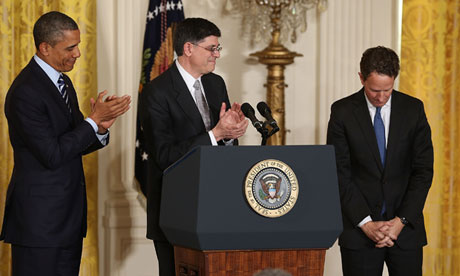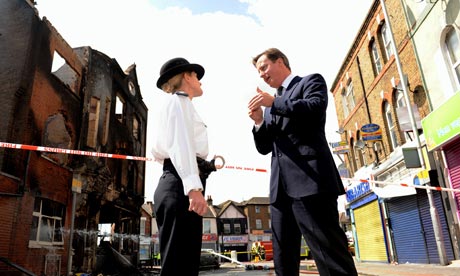First the treasury secretary propped up the big banks with public spending. Then he backed their agenda: cuts to public spending

Departing Treasury
Secretary Timothy Geithner is congratulated by President Barack Obama
and his next nominee, Jack Lew. Photograph: Mark Wilson/Getty Images
Treasury Secretary Timothy Geithner's departure from the Obama administration invites comparisons with Klemens von Metternich.
Metternich was the foreign minister of the Austrian empire who
engineered the restoration of the old order and the suppression of
democracy across Europe after the defeat of Napoleon.
This was an impressive diplomatic feat – given the widespread popular contempt for Europe's monarchical regimes. In the same vein, protecting Wall Street from the financial and economic havoc they brought upon themselves and the country was an enormous accomplishment.
During his tenure as head of the New York Fed and then as treasury secretary, most, if not all, of the major Wall Street banks would have collapsed if the government had not intervened to save them. This process began with the collapse of Bear Stearns, which was bought up by JP Morgan in a deal involving huge subsidies from the Fed.
The collapse of Lehman Brothers, a second major investment bank, started a run on the three remaining investment banks that would have led to the collapse of Merrill Lynch, Morgan Stanley, and Goldman Sachs if the Fed, FDIC, and treasury had not taken extraordinary measures to save them. Citigroup and Bank of America both needed emergency facilities established by the Fed and treasury explicitly for their support, in addition to all the below market-rate loans they received from the government at the time. Without this massive government support, there can be no doubt that both of them would currently be operating under the supervision of a bankruptcy judge.
Of the six banks that dominate the US banking system, only Wells Fargo and JP Morgan could conceivably have survived without hoards of cash rained down on them by the federal government. Even these two are questionmarks, since both helped themselves to trillions of dollars of below market-rate loans, in addition to indirectly benefiting from the bailout of the other banks that protected many of their assets.
Had it not been for Geithner and his sidekicks, therefore, we would have been permanently rid of an incredibly bloated financial sector that haunts the economy like a horrible albatross.
Along with the salvation of the Wall Street banks, Geithner also managed to restore their agenda of deficit reduction. Even though the economy is still down more than 9 million jobs from its full employment level, none of the important people in Washington is talking about measures that would hasten job creation.
Instead, the focus is exclusively on deficit reduction, a process that is already slowing growth and putting even more people out of work. While lives are being ruined today by the weak economy, Geithner helped create a policy agenda where the focus of debate is the budget projections for 2022.
These projections are hugely inaccurate. Furthermore, the actual budget for 2022 is largely out of the control of any politicians currently in power, since the Congresses elected in 2016, 2016, 2018, and 2022, along with the presidents elected in 2016 and 2020, may have some different ideas.
Nonetheless, the path laid out by Geithner's team virtually ensures that these distant budget targets will serve as a distraction from doing anything to help the economy now.
There are two important points that should be quashed quickly in order to destroy any possible defense of Timothy Geithner.
It is often asserted that we were lucky to escape a second Great Depression. This is nonsense.
The first Great Depression was not simply the result of bad decisions made in the initial financial crisis. It was the result of ten years of failed policy. There is zero, nothing, nada that would have prevented the sort of massive stimulus that was eventually provided by the second world war from occurring in 1931, instead of 1941. We know how to recover from a financial collapse: the issue of whether we do so simply boils down to political will.
This is demonstrated clearly by the case of Argentina, which had a full-fledged collapse in December of 2001. After three months of freefall, its economy stabilized in the second quarter of 2002. It came roaring back in the second half of the year and had made up all of the lost ground by the middle of 2003. Its economy continued to grow strongly until the 2009, when the world economic crisis brought it to a standstill. There is no reason to believe that our policymakers are less competent than those in Argentina: the threat of a second Great Depression was nonsense.
Finally, the claim that we made money on the bailouts is equally absurd. We lent money at interest rates that were far below what the market would have demanded. Most of this money, plus interest, was paid back. But claiming that we thus made a profit would be like saying the government could make a profit by issuing 30-year mortgages at 1% interest. Sure, most of the loans would be repaid, with interest, but everyone would understand that this was an enormous subsidy to homeowners.
In short, the Geithner agenda was to allow the Wall Street banks to feed at the public trough until they were returned to their prior strength. Like Metternich, he largely succeeded.
Of course, democracy did eventually triumph in Europe. Let's hope that it doesn't take quite as long for that to happen here.
This was an impressive diplomatic feat – given the widespread popular contempt for Europe's monarchical regimes. In the same vein, protecting Wall Street from the financial and economic havoc they brought upon themselves and the country was an enormous accomplishment.
During his tenure as head of the New York Fed and then as treasury secretary, most, if not all, of the major Wall Street banks would have collapsed if the government had not intervened to save them. This process began with the collapse of Bear Stearns, which was bought up by JP Morgan in a deal involving huge subsidies from the Fed.
The collapse of Lehman Brothers, a second major investment bank, started a run on the three remaining investment banks that would have led to the collapse of Merrill Lynch, Morgan Stanley, and Goldman Sachs if the Fed, FDIC, and treasury had not taken extraordinary measures to save them. Citigroup and Bank of America both needed emergency facilities established by the Fed and treasury explicitly for their support, in addition to all the below market-rate loans they received from the government at the time. Without this massive government support, there can be no doubt that both of them would currently be operating under the supervision of a bankruptcy judge.
Of the six banks that dominate the US banking system, only Wells Fargo and JP Morgan could conceivably have survived without hoards of cash rained down on them by the federal government. Even these two are questionmarks, since both helped themselves to trillions of dollars of below market-rate loans, in addition to indirectly benefiting from the bailout of the other banks that protected many of their assets.
Had it not been for Geithner and his sidekicks, therefore, we would have been permanently rid of an incredibly bloated financial sector that haunts the economy like a horrible albatross.
Along with the salvation of the Wall Street banks, Geithner also managed to restore their agenda of deficit reduction. Even though the economy is still down more than 9 million jobs from its full employment level, none of the important people in Washington is talking about measures that would hasten job creation.
Instead, the focus is exclusively on deficit reduction, a process that is already slowing growth and putting even more people out of work. While lives are being ruined today by the weak economy, Geithner helped create a policy agenda where the focus of debate is the budget projections for 2022.
These projections are hugely inaccurate. Furthermore, the actual budget for 2022 is largely out of the control of any politicians currently in power, since the Congresses elected in 2016, 2016, 2018, and 2022, along with the presidents elected in 2016 and 2020, may have some different ideas.
Nonetheless, the path laid out by Geithner's team virtually ensures that these distant budget targets will serve as a distraction from doing anything to help the economy now.
There are two important points that should be quashed quickly in order to destroy any possible defense of Timothy Geithner.
It is often asserted that we were lucky to escape a second Great Depression. This is nonsense.
The first Great Depression was not simply the result of bad decisions made in the initial financial crisis. It was the result of ten years of failed policy. There is zero, nothing, nada that would have prevented the sort of massive stimulus that was eventually provided by the second world war from occurring in 1931, instead of 1941. We know how to recover from a financial collapse: the issue of whether we do so simply boils down to political will.
This is demonstrated clearly by the case of Argentina, which had a full-fledged collapse in December of 2001. After three months of freefall, its economy stabilized in the second quarter of 2002. It came roaring back in the second half of the year and had made up all of the lost ground by the middle of 2003. Its economy continued to grow strongly until the 2009, when the world economic crisis brought it to a standstill. There is no reason to believe that our policymakers are less competent than those in Argentina: the threat of a second Great Depression was nonsense.
Finally, the claim that we made money on the bailouts is equally absurd. We lent money at interest rates that were far below what the market would have demanded. Most of this money, plus interest, was paid back. But claiming that we thus made a profit would be like saying the government could make a profit by issuing 30-year mortgages at 1% interest. Sure, most of the loans would be repaid, with interest, but everyone would understand that this was an enormous subsidy to homeowners.
In short, the Geithner agenda was to allow the Wall Street banks to feed at the public trough until they were returned to their prior strength. Like Metternich, he largely succeeded.
Of course, democracy did eventually triumph in Europe. Let's hope that it doesn't take quite as long for that to happen here.


